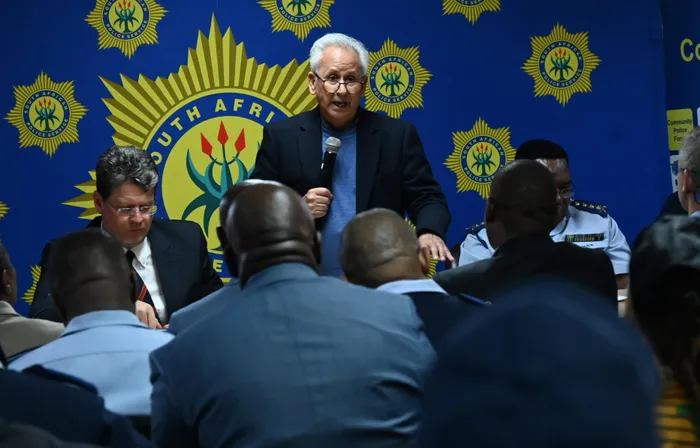Police plan to fight Cape Flats gang violence not yet in place, says minister

Minister of Police, Professor Firoz Cachalia at Mfuleni Police station after a visit to Mitchells Plain.
Image: Ayanda Ndamane/ Independent Media
Acting Police Minister Professor Firoz Cachalia has admitted that he does not believe there is yet a concrete plan to stop the wave of gang violence devastating the Cape Flats.
Cachalia on Tuesday told Mitchells Plain residents that while a strategy had been presented to him, it has not been resourced or implemented.
“The provincial commissioner and the head of crime intelligence presented me with a plan. They must still implement that plan. They must still resource that plan, that plan that is needed. So we need a stabilisation plan.
"We need to go on the offensive against the drug lords, stabilise our communities, make sure that we are in charge, not the criminals. But the truth is, I don’t believe that plan is yet in place,” Cachalia said during a community engagement.
The minister reflected on his past as an activist, and told residents that gangs had long existed in communities, but that their reach and wealth now placed them in a new category.
“These gangs are evolving into organised crime, transnational crime. You see how rich these people are becoming. They can recruit people and pay them. I understand they are paying R2500, more than many young people can earn in employment,” he said.
Abie Isaacs, founder of the Cape Flats Safety Forum, said residents were shocked to hear from the minister himself that no clear strategy was in place.
“We were seriously surprised to hear that there is no gang plan, no real strategy, while people are still dying in our streets. How many more lives must be lost before this plan is finalised? The minister said maybe in a week or two weeks there will be something, specifically to deal with gangsterism and gun violence. But right now, there is nothing, and we are hardly optimistic.
“We asked directly about intelligence in this province, and there was no answer. The minister himself said that most of these problems must be addressed through intelligence. That does not give us confidence that the killings are being fought in the right way."
Isaacs acknowledged that Cachalia was "open and honest".
"Unlike others who came before with pre-packaged ideas, he admitted the truth that the plan still has to be implemented by the provincial commissioner. But we’ve gone through this process before. We’ve sat for three, four hours in meetings like this, and we keep hearing the same rhetoric, the same answers. As the Cape Flats Safety Forum, we remain deeply concerned. We are told there will be a plan, but until it is implemented, our communities continue to suffer,” Isaacs said.
Other residents at the meeting said the crisis was worsening daily and that ordinary people were being left unprotected.
Mark Buckenjohn criticised police leadership for arriving late, asking, “Are we serious here? People have died, and you arrived late. I want to know whether we are serious here?”
He later apologised to the panel but added that Mitchells Plain residents wanted “an army of social workers” rather than a military presence.
“We live in what feels like a war zone. Who is protecting us? We need peace. Detectives are overwhelmed; they investigate one shooting only for another to happen. The system is overloaded, and cases often go nowhere. The courts are too small and backlogged to handle the scale of crime we face,” he said, urging councillors to open community centres as safe spaces for young people.
Linda Jones from the Mitchells Plain United Residents Association said repeat offenders were returning to communities because of parole laws and poor enforcement.
A Tafelsig High School learner appealed directly to Cachalia, saying schools were no longer safe. “We have gangsters coming into our schools. We have drugs that have made their way into our school. Is there a plan to protect us?”
Police Oversight and Community Safety MEC Anroux Marais said the issue could not be solved by policing alone.
“Gang violence is not just a policing issue - it is a social crisis, and it thrives where hope is scarce, where opportunities are limited, and where young people are left behind. Our job is not only to see to the arresting of criminals but also to disrupt the cycle that creates them,” she said, pointing to a Mitchells Plain safety and development plan being drafted through her department.
Portfolio Committee on Police chairperson Ian Cameron pressed for intelligence-led policing, decentralisation of resources, and greater cooperation between SAPS, metro, and provincial law enforcement.
“From September 1 to 9, there were 34 murders across just 13 so-called gang stations. We must target kingpins. Why not allow competent local and provincial governments to take on more policing powers? Legislation already allows for this,” he said.
Cameron warned that crime scene units covering 27 police stations in the metro often had just two members and no more than three vehicles, when at least ten members and six vehicles per shift were needed.
He also called for integrity testing of police officers and more use of specialised units.
Cape Times
Related Topics: